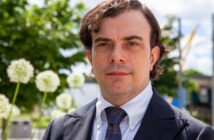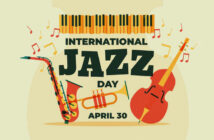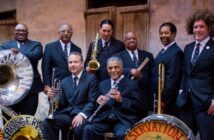
This page is also available in / Cette page est également disponible en:
![]() Francais (French)
Francais (French)
If Blue Note’s main accomplishment was to define the shape of modern jazz by successfully negotiating its transition out of the classic era, ECM Records took the next step, from its modern age to a contemporary one. One need not go further than its name to make the point, it being an acronym for Edition of Contemporary Music. Judging their respective outputs, no two labels can be more different than these, their only commonality being that Wolf and Lion were both German nationals like ECM’s founder Manfred Eicher, a Munich resident. The biographies of these men underscore their vastly different pursuits, the latter a classically trained bassist who set aside his bow and strings for good around 1970 for the sake of microphones and soundboards, the former music lovers with no musical knowledge or hands-on experience.
In the documentary sounds and silence (shot the year of the label’s 40th anniversary), Eicher justifies his decision on the grounds that he did not hear the same thing at all when he stood in front of an orchestra than in it. In 1969, at 27, he took the plunge by hiring an American expat living in Munich, pianist and one-time Blue Note recording artist Mal Waldron, to record an album. Free at Last would be the label’s initial release, and sole entry of the pianist in a vast catalogue now exceeding over a thousand titles.
Like any newcomer to the trade, there was some dabbling on his part in the beginning: after testing the waters of the jazz avant-garde and its European free-music counterpart, Eicher opted for a more subdued approach to music making, introspective in tone and flirting with silence itself. The most suitable instrument to this end would be the piano, and in short order he recruited the rising keyboardist Chick Corea; Paul Bley, to whom he offered his first solo outing; and the most notable of them all, Keith Jarrett, who would score the label’s first and most enduring success, the Köln Concert of 1975.
ECM’s arrival on the scene was serendipitous in a way, for it came into being in an era when European jazz wanted to rid itself of its American shackles. Eicher helped define some of that identity. Far from limiting himself to that field, he took another important step by starting his New Series, devoted to a kind of neo-classicism represented by composers like Arvo Pärt and Eleni Karaindrou, both prominently featured in the documentary. In fact, there is very little jazz heard in this feature, save for excerpts from a studio shoot of drummer Manu Katché and his quintet, tacked on as a bonus track in this package provided with separate subtitle options in German, English and French. While seen throughout, the producer addresses the musicians more than the camera itself, which is par for the course for a man who shuns interviews. Regardless of one’s attitudes towards the label – and there are as many detractors as there are supporters— there is no denying the artistic integrity of Herr Eicher and his work.
This page is also available in / Cette page est également disponible en:
![]() Francais (French)
Francais (French)











